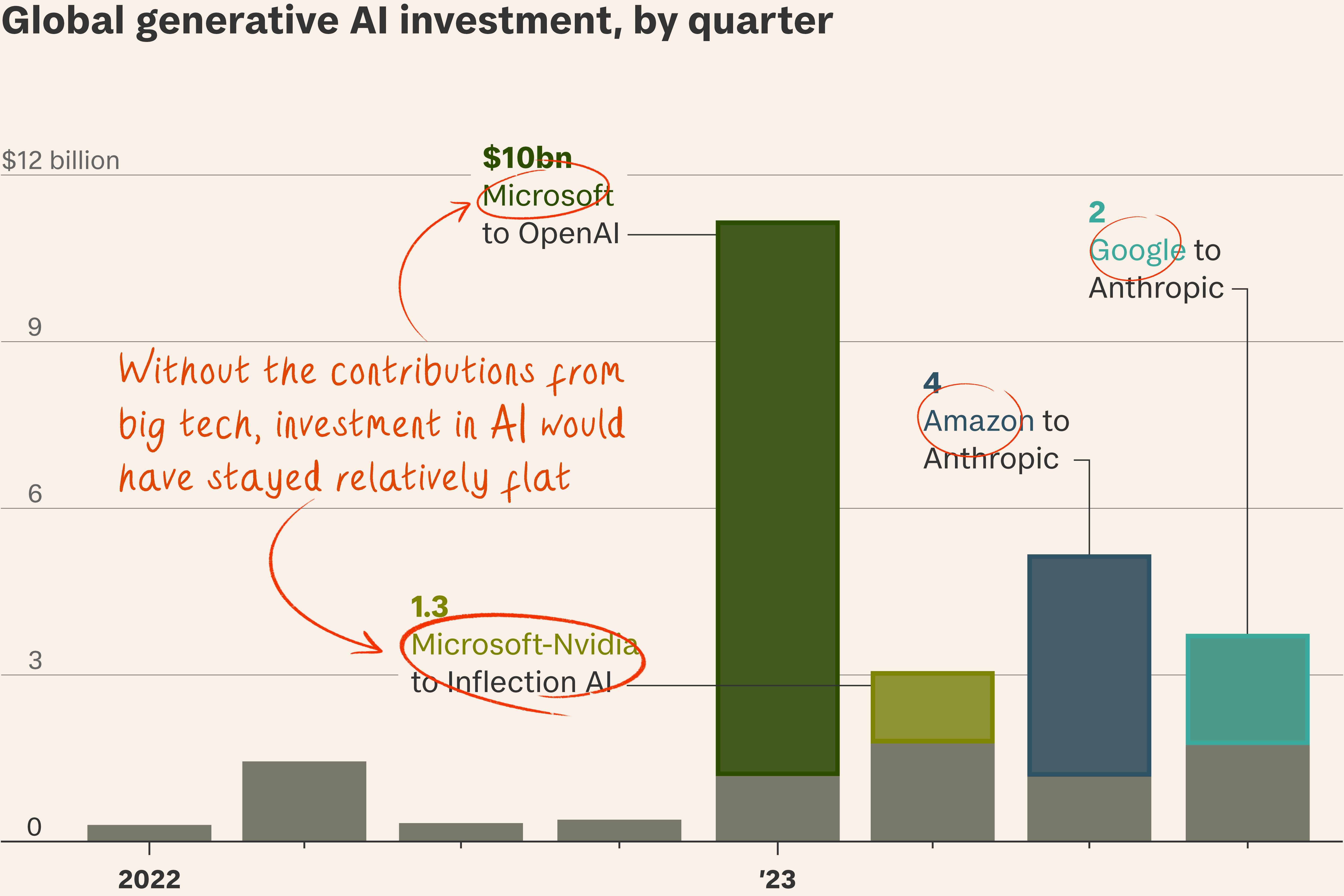
The fate of a billion-dollar AI start-up is in the balance after a year of breakneck spending and the chaotic departure of its founder.
So what? StabilityAI is an object lesson for the industry. Its slumping fortunes are a warning for a sector increasingly defined by unsustainable amounts of cash, computing power, energy and hype.
- Last year saw record investment in AI but scant profit except for a few chip-makers.
- Last month, the co-founders of Inflection AI – another breathlessly-promoted generative AI startup – left for Microsoft.
This is a field with a handful of behemoths but no proven business model for everyone else. A reckoning may be due.
Instability AI. Once among the world’s buzziest startups, StabilityAI was valued at $1 billion in 2022, thanks largely to its flagship AI model Stable Diffusion, which can quickly create images from written prompts.
In March, Emad Mostaque, its founder and a former crypto boss, optimistically announced that he’d resigned from his role as CEO in order to decentralise “the concentration of power in AI”. The picture inside the company is not so rosy:
- Dwindling funds. A year after its $1 billion valuation, Stability had just $4 million in the bank and mounting debt. It has yet to achieve a month of profit. Last year it raised about $80 million in new funds after failing to attract significant investor interest. One investor called on Mostaque to step down. Others worried that he’d exaggerated his credentials (Mostaque denies this).
- Debt. According to Forbes, the company defaulted on payments to Amazon Web Services and owes millions to other cloud companies, which provide startups with the computing power needed for their AI models. It also faces steep legal costs from a high-profile copyright case brought by Getty Images.
- Departures. The months before Mostaque’s departure saw a wave of staff exits, including the key scientists behind Stable Diffusion. Former staff say Stability is in a “death spiral”.
- Delusion? Mostaque was scrambling to come up with new ideas to make money – including producing bespoke national AI models for governments and reselling a cluster of Nvidia A100 chips – none of which bore fruit.
Grifter magnet. Venture capitalists funnelled $29 billion into generative AI last year, up from under $8 billion in 2022. Demis Hassabis, co-founder of DeepMind, which was bought by Google in 2014, once said the wave of investment “brings with it a whole attendant bunch of hype and maybe some grifting”.
Fantasy. Amazon’s cloud boss likened the hype surrounding generative AI to the dot com bubble.
- The ultimate aim for many of these companies is AGI – artificial general intelligence – an idea with no strict definition. This means startups are scrambling to produce a technology that is vaguely intelligent but has no defining characteristics. ChatGPT, OpenAI’s viral chatbot and the clear frontrunner in the generative AI race, can hold impressive conversations but is still prone to hallucinations – meaning it makes up information.
- Hassabis himself has overstated the power of his technology. Last November, Google announced a pioneering AI tool that helped discover 2.2 million new crystals, which it promised could help with everything from powering smartphones to the energy transition. This week, an academic study found “scant evidence for compounds that fulfil the trifecta of novelty, credibility, and utility”.
Reality. The price of entry to the gen AI club is so high that most minnows go to the wall or get eaten by one of a small and rapidly shrinking number of barracudas.
- Struggling start-ups like Stability and Cognition Labs (seeking a $2 billion valuation after generating no revenue last year) can make Truth Social look robust.
- Microsoft, Alphabet and Meta meanwhile form what UCL’s Jack Stilgoe calls “an emerging generative AI oligopoly”. But even the big players are struggling. Google – once the darling of AI – has burned money trying to compete with OpenAI’s GPT-4 and has little to show for it.
What’s more. The oligopoly is still betting on generative AI but for now the only winner is Nvidia – the company powering the whole sector with its chips.





